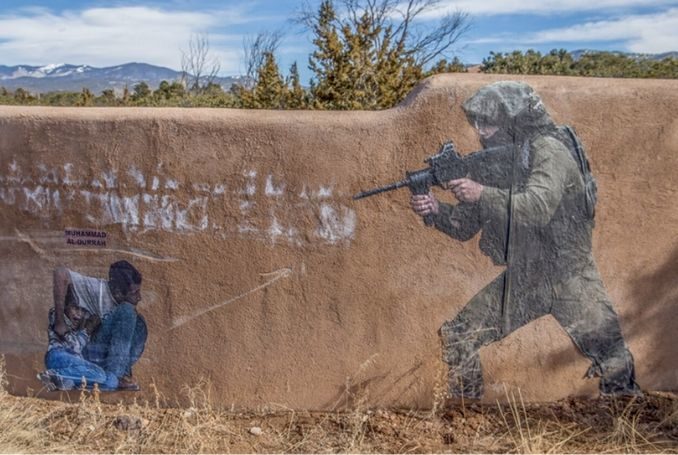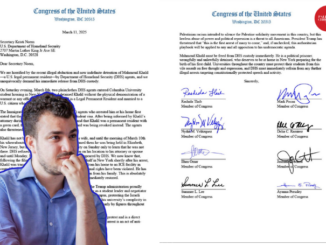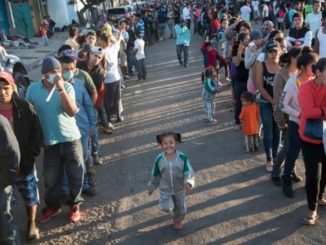
By Benay Blend
Both Israel and North America share similar rhetoric that justifies their origins. Infused with biblical references to “salvation, redemption, and destiny,” settlers in both countries believed that they had reached the Promised Land.
Several years ago Native activists successfully rallied their city councils to replace Columbus Day, the day that honors the Italian explorer who was a destroyer of Native worlds, with Indigenous Peoples Day, a holiday that celebrates the Natives who have resisted colonial oppression for over 500 years, since the arrival of Christopher Columbus.
It is also a good time to highlight Indigenous solidarity within the Americas as well as with other Indigenous people, including the Palestinians. Indeed, both people share a similar story of resistance to colonization, while the colonizers—the United States and Israel—share similar origin stories and tactics used to sever the Native people from their land.
In “Inter/Nationalism from the Holy Land to the New World: Encountering Palestine in American Indian Studies,” Steven Salaita traces some of the ways that colonial rhetoric in North America and Palestine sprang from the same “narratives of settlement,” while also examining how Palestinian and Native people have resisted those discourses of occupation.
On Indigenous People’s Day, its useful to point out the significance of the term “Indigenous.” According to Salaita, it means that Palestinian dispossession is rightly placed within the framework of colonial history rather than in a-historical terms. Moreover, it locates Palestinians within a broader struggle for liberation and decolonial status.
As Salaita notes, the trajectory of North American colonization has been instrumental in furthering an understanding of Israeli colonial practices as well as Palestinian resistance strategies and nation-building. On the other hand, studies of Palestine by Indigenous scholars have augmented an understanding of American imperialist and economic policies by bringing these issues up to date.
In addition, both Israel and North America share similar rhetoric that justifies their origins. Infused with biblical references to “salvation, redemption, and destiny,” settlers in both countries believed that they had reached the Promised Land, where God commanded them to eliminate the Indigenous populations to make way for more fertile land that had previously been “underused and unappreciated by the natives.”
In fact, Salaita claims that despite “military, economic, diplomatic, cultural, historical, [and] religious] interactions between America and Israel,” the “manifest Holy Land ethos” has played the greatest role in connecting the development of both countries.
In “Settler ‘Self-defense’ and Native Liberation,” Nick Estes explains how the brutal assault on Gaza since October 7th has deep ideological roots in Turtle Island. While “dehumanization is the first step in genocidal incitement,” what comes next is crucial, i.e. the notion that settler colonialists must commit genocide against the Native people to avoid the same being done to them.
Estes finds other commonalities among settler colonial states. “Settler colonialism wages total war on Native societies by attempting to eliminate and destroy familial and kinship relations through a combination of physical destruction, incarceration, and family separation.”
For example, residential boarding school schools were known for kidnapping children away from their families, abusing them, then burying their remains in unmarked graves. In Gaza, “srael has systematically eliminated entire families, displaced others, and razed much of the Strip—all done to annihilate Palestinians altogether.
In Gaza, Israel has destroyed the educational system by eradicating its schools, along with many of the children who attend.
In the United States, efforts are underway to ensure that anti-Palestinian, anti-Zionist ideology lives on. “The United States has clamped down on its own educational system,” writes Estes, “banning books teaching its true settler colonial history, while brutalizing college students and cracking down on educators opposing its genocide against Palestinians.”
This is the area, Salaita claims, in which both countries most closely ally. There is still hope, however, for what has come out of this transnational approach is a desire to move beyond intellectual engagement to promote activism in the field.
“Professions of material engagement and commitment to self-determination are common,” writes Salaita, leading today to faculty support for student encampments which have sprung up in the past year to show support for Palestinian self-determination and resistance.
Titled “My Ancestors Would Be Proud,” Leanne Betasamosake Simpson, a Michi Saagiig Nishnaabe writer, musician and academic, describes her experience of doing a teach-in at the People’s Circle for Palestine occupying King’s College Circle at the University of Toronto.
There she visited the Sacred Fire in the eastern doorway, tended by firekeepers, aunties and grandmothers from Anishinaabe homelands and offered tobacco for the Palestinians in Gaza, the West Bank, 48 and the diaspora, and for the over 40,000 Gazans killed by US-funded Israeli bombs.
Although she saw that students acknowledged the violence of colonialism that had stripped her people of their homeland, she also witnessed their efforts to create a world using the traditional practice of mino-bimaadiziwin, a way of living that depends on relationality, in this case, a trans-national mutuality that includes the Palestinians.
“Indigenous struggles for liberation exist at the axis of what it means to contest empire, militarism, and economic injustice,” concludes Salaita, thus encouraging material and cultural exchanges across colonial borders. The cojoining of Palestine and Native studies also “represents a deterritorialization of traditional disciplinary areas,” Salaita writes, breaking down academic borders that have sometimes served to foment turf wars when those boundaries have been crossed.
In order to “function optimally,” Salaita warns, the “starting point of inter/nationalist methodologies, in both research and political organizing, must be sincere commitment to solidarity,” defined as the “pursuit of common goals—in this case a common future” in which communities are organized around the ideal of justice rather than the capitalist goal of profit.
In this vein, the Red Nation, in a 2019 Statement, expressed solidarity with the Palestinian struggle. “Palestine is the moral barometer of Indigenous North America,” a declaration that goes to the core of Salaita’s vision of inter/nationalism.
After October 7, several Native nations decided to join the call for a ceasefire, including the Oglála Lakhóta Oyáte, Cheyenne River Lakota, Yurok Tribal Council, Winnemem Wintu Tribe, the Red Lake Band of Chippewa Indians, and the Oceti Sakowin Treaty Council, among others. A symbolic gesture, it nevertheless recognizes trans/national Indigenous solidarity.
Above all, perhaps what both people have most in common is endurance. “Palestinians have endured 76 years of the Nakba and now the 2024 genocide,” writes Qassam Muaddi. “Despite Israel and the West’s desire to erase our existence, we continue to declare, ‘We won’t leave.’”
After a year of Israel’s genocidal siege, Muaddi continues, every school has been destroyed, every hospital bombed, every family driven from their homes, and still the Western world declared that Palestinians are “human animals.”
Nevertheless, this has also been a year of Palestinian sumud (steadfastness), and of “global solidarity” with Muaddi’s people. After “76 years of Nakba and ethnic cleansing, Gaza is not dead,” he concludes.” Its social cohesion still stands. The resolve of its people to start life from scratch has proven time and time again, after every Israeli withdrawal from any destroyed neighborhood, to be unbroken.”
Everywhere they live—in the West Bank, Jerusalem, and elsewhere—”Palestinians continue to live and recreate life every single day, without having submitted. It has been a year of resilience and perseverance. Something that only humans, on the highest levels of humanity, can do.”
In an interview with Christina Verán of Cultural Survival, Nick Tilsen, President and CEO of NDN Collective, elaborated on his personal story of being Oglala Lakota and Jewish. From his grandfather, an attorney for the American Indian Movement from the Polish/Russian border, he learned that, because Jewish people have for so long survived persecution, it is why that side of his family “as Jews, have a responsibility to be in solidarity with those who are experiencing persecution today. And the act of doing so… that is Jewish.”
On his Lakota side, Tilsen notes a shared history with Palestinians. “In our mutual experience of settler-colonial violence, the incarceration of our Peoples, efforts to distort and destroy our fights for liberation, and even the fact of surviving through all of that… we find comrades, brothers and sisters, relationships.”
Like, Muaddi, his outlook is hopeful.
“The Oceti Sakowin (People of the Great Plains of North America) are still here, and we will continue to fight for the Black Hills. The colonizer tried to beat the language out of us, they tried to beat our culture out of us, they tried to beat our connection to the land out of us—and they failed. And so, colonization… it’s not a done deal. Just like the fate of Palestine is not a done deal. Anything is possible.”

– Benay Blend earned her doctorate in American Studies from the University of New Mexico. Her scholarly works include Douglas Vakoch and Sam Mickey, Eds. (2017), “’Neither Homeland Nor Exile are Words’: ‘Situated Knowledge’ in the Works of Palestinian and Native American Writers”. She contributed this article to The Palestine Chronicle.








The same can be said about the indigenous struggles in the Pacific region. It was in 988 that I realized that what the Australian First Nations (aka Aborigines) had suffered terribly during colonialization. And in 1988 I finally got and learned the history of the European colonization of New Zealand. When I encountered the Palestine Research Center books in the U of Canterbury library, I realized that Palestinians had and were going through the same trauma, and so Israel had a major case to answer for. Israel is making it much, much worse.